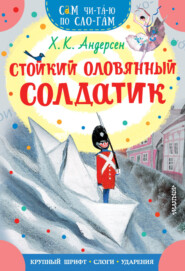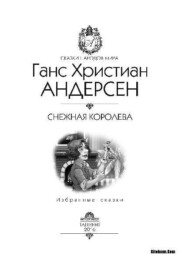По всем вопросам обращайтесь на: info@litportal.ru
(©) 2003-2024.
✖
O. T., A Danish Romance
Настройки чтения
Размер шрифта
Высота строк
Поля
“Yes, we mast try it!” said she; “it is excellent! I also will be put to the proof, although I am initiated into the mystery.”
“Yes, you, your sister, Wilhelm, Eva, we all of us must,” said Otto. “Only I will not do the speaking: that the steward must do.”
“That is proper, very proper!” replied she: “it shall be tried this evening when it is dark.”
The time came; the steward assembled the people.
“Now I know,” said he, “how we shall find the thief!”
All were to remain in the first room: within a side-room, which was quite dark, there stood in a corner on the right hand a copper kettle; to this every person as they came in, one by one, were to go and lay their hand down on the flat bottom of the kettle. The hand of every one who was innocent would be brought out again white and pure, but the hand of the criminal would be severely burned, and would become black as a coal.
“He who now,” said the steward, addressing them, “has a good conscience, may go with this and our Lord into the innermost room, lay his hand upon the bottom of the kettle, and show it to me. Now I go to receive you all!”
The daughters went, the friends, Eva, and all the household. The steward questioned them as they came in: “Answer me, upon thy conscience, did thy hand touch the flat bottom of the kettle?”
All replied, “Yes!”
“Then show me your hand!” said he; and they showed them, and all were black: Sidsel’s alone was white.
“Thou art the thief!” said the steward. “Thy evil conscience has condemned thee. Thou hast not touched the kettle; hast not laid thy hand upon it, or it would have become as black as that of the others. The kettle was blackened inside with turpentine smoke; they who came with a good conscience, knowing that their hands would remain pure like their consciences, touched the kettle fearlessly and their hands became black! Thou hast condemned thyself! Confess, or it will go worse with thee!”
Sidsel, uttered a horrible cry and fell down upon her knees.
“O God, help me!” said she, and confessed that she was the thief.
A chamber high up in the roof was prepared as a prison; here the delinquent was secured until the affair, on the following day, should be announced to the magistrate.
“Thou shalt be sent to Odense, and work upon the treadmill!” said Wilhelm: “to that thou belongest!”
The family assembled at the tea-table. Sophie joked about the day’s adventure.
“Poor Sidsel!” said Eva.
“In England she would be hanged,” said Wilhelm; “that would be a fine thing to see!”
“Horrible!” replied Louise; “they must die of terror in going to the gallows.”
“Nay, it is very merry,” said Wilhelm. “Now you shall hear what glorious music has been set to it by Rossini!” And he played the march from “Gazza Ladra,” where a young girl is led to the gallows.
“Is it not merry?” asked he. “Yes, he is a composer!”
“To me it seems precisely characteristic,” answered Otto. “They are not the feelings of the girl which the composer wished to express; it is the joy of the rude rabble in witnessing an execution—to them a charming spectacle, which is expressed in these joyous tones: it is a tragic opera, and therefore he chose exactly this character of expression!”
“It is difficult to say anything against that,” replied Wilhelm; “yet what you assert I have not heard from any other person.”
“When a soldier is executed they play some lively air,” said Otto; “the contrast in this case brings forth the strongest effect!”
The servant now entered, and said with a smile that Peter Cripple, the “new-married man,” as he called him, was without and wished to speak to the Baron Wilhelm.
“It is about a waltz,” said he, “which the Baron had promised to him!”
“It is late for him to come into the court!” said Sophie “the peasants generally go to bed with the sun.”
In the lobby stood the announced Peter in his stocking-feet, with his hat in one hand and a great stick in the other. He knew, he said, that it was still daytime with the gentlefolks; he was just coming past the hall and thought that he could, perhaps, have that Copenhagen Waltz which the Baron had promised him: he should want it to-morrow night to play at a wedding, and, therefore, he wished to have it now that he might practice it first of all.
Sophie inquired after his young wife, and said something merry. Louise gave him a cup of tea, which he drank in the lobby. Otto looked at him through the open door; he made comical grimaces, and looked almost as if he wished to speak with him. Otto approached him, and Peter thrust a piece of paper into his hand, making at the same time a significant gesture indicative of silence.
Otto stepped aside and examined the dirty piece of paper, which was folded together like a powder and sealed with a lump of wax. On the outside stood, in scarcely legible characters,
“TotH’ WeL-borne,
Mr. Odto Tustraab.”
He endeavored, in the first place, to read it in the moonlight; but that was scarcely possible.
After considerable labor he made out the meaning of this letter, written, as it was in a half-German, half-Danish gibberish, of the orthography of which we have given a specimen in the direction. The letter was from the German Heinrich. He besought Otto to meet him this evening in the wood near Peter Cripple’s house, and he would give to him an explanation which should be worth the trouble of the walk. It would occasion, he said, much trouble and much misery to Mr Thostrup if he did not go.
A strange anxiety penetrated Otto. How could he steal away without being missed? and yet go he both must and should. An extraordinary anxiety drove him forth.
“Yes, the sooner the better!” said he, hastening down the steps and leaping in haste over the low garden-fence lest the gate should, perhaps, make a noise. He was very soon in the wood: he heard the beating of his own heart.
“Eternal Father!” said he, “strengthen my soul! Release me from this anxiety which overpowers me! Let all be for the best!”
He had now reached Peter Cripple’s house. A figure leaned against the wall; Otto paused, measured it with his eye to ascertain who it was, and recognized German Heinrich.
“What do you want with me?” inquired Otto.
Heinrich raised his hand in token of silence, beckoned him forward, and opened a little gate which led to the back of the house. Otto mechanically followed him.
“It goes on badly at the hall,” said Heinrich. “Sidsel is really put in prison, and will be taken to-morrow to Odense, to the red house by the river.”
“It is what she has deserved!” said Otto. “I did not bring it about.”
“O no!” answered Heinrich; “in a certain way we bring nothing about; but you can put in a good word for her. You must see that this punishment does not befall her.”
“But the punishment is merited!” replied Otto; “and how can I mix myself up in the affair? What is it that you have to say to me?”
“Yet, the good gentleman must not get angry!” began Heinrich again; “but I am grieved about the girl. I can very well believe that he does not know her, and therefore it gives him no trouble; but if I were now to whisper a little word in his ear? She is your own sister, Mr. Thostrup!”
All grew dark before Otto’s eyes; a chill as of death went through his blood; his hands held firmly by the cold wall, or he must have sunk to the earth; not a sound escaped his lips.
German Heinrich laid his hand in a confidential manner upon his shoulder, and continued in a jeering, agitated tone, “Yes, it is hard for you to hear! I also struggled a long time with myself before I could make up my mind to tell you. But a little trouble is preferable to a great one. I had some talk with her yesterday, but I did not mention you, although it seemed queer to me at my heart that the brother should sit at the first table with the young ladies, and the sister be farm swine-maiden. Now they have put her in prison! I am very sorry for her and you too, Mr. Thostrup, for it is disagreeable! If the magistrate come to-morrow morning, and she fall into the claws of the red angel, it will not be so easy to set her at liberty again! But yet you could, perhaps, help her; as, for instance, to-night! I could make an opportunity—I would be in the great avenue beyond the hall. If she could get thus far she would be safe; I would then conduct her out of this part of the country. I may as well tell you that we were yesterday half-betrothed! She goes with me; and you can persuade the gracious lady at the hall to let the bird fly!”
“But how can I? how can I?” exclaimed Otto.
“She is, however, always your sister!” said Heinrich, and they both remained silent for a moment. “Then I will,” said Heinrich, “if all be still at the hall, wait in the avenue as the bell goes twelve.”
“I must!” exclaimed Otto; “I must! God help me!”

















